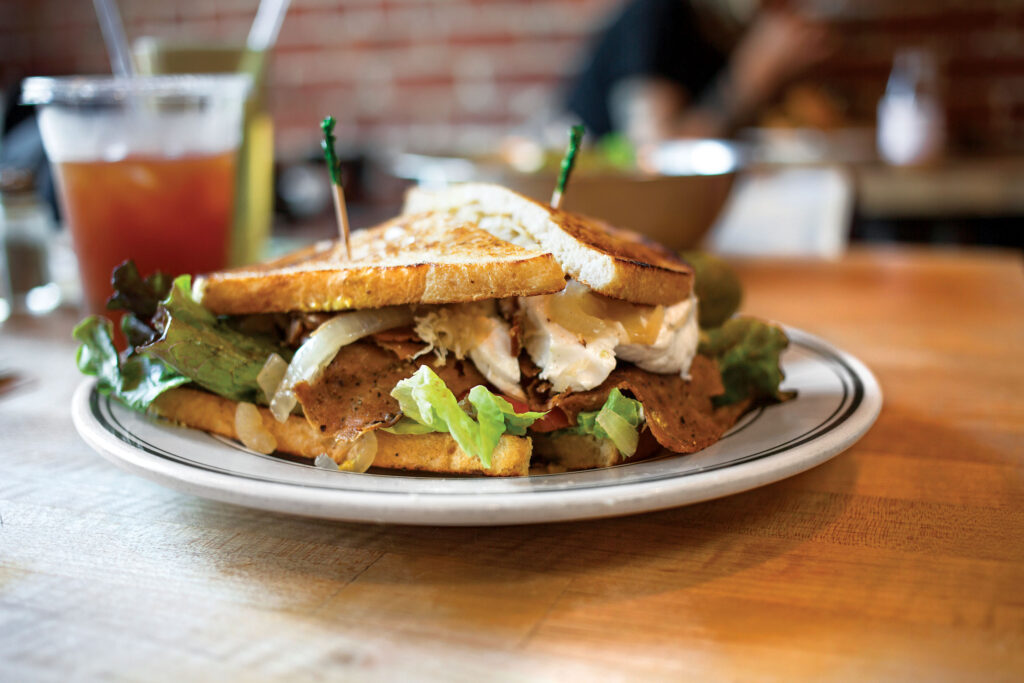Advertisement
Move Over Meat
There’s a new butcher in town

I’ll be honest: the first time I heard the term “vegan butchers” I rolled my eyes. My imagination conjured up images of earnest beardy types in butcher’s aprons, deftly carving up slices of eggplant and cauliflower. What fresh hipster hell was this, I thought?
But I couldn’t have been more wrong. After interviewing three of the people at the forefront of this new wave of plant-based foods, I realized this was no hipster trend. This is more the next logical step for people looking to reduce animal proteins in their daily diets in a stress-free way.
Vegan butchers, put simply, provide the traditional butcher shop/deli experience of cold cuts and minimal-prep meals to go—but without any dead animals! Instead, you’ll find plant-based, centre-of-the-plate proteins in easily recognizable forms from pork-less pulled pork to chicken-free fried chicken and tuna-less tuna salads. Here are the stories of three of North America’s pioneering vegan butchers.
Go Global: 7 places to try vegan butchery
- The Herbivorous Butcher—Minneapolis, Minnesota
They’re known for their beer brats and Cuban pork. theherbivorousbutcher.com - No Evil Foods—Asheville, North Carolina
Don’t miss their El Zapatista Mexican sausage—perfect for tacos, and no-chicken “Comrade Cluck.” noevilfoods.com - Monk’s Meats—Brooklyn, New York
Hipster heaven with comfort foods like asparagus and seitan steaks, and shiitake bacon. monksmeats.com - Sova Food—Dublin, Ireland
Chow down on seaweed chowder and chia burgers. facebook.com/SovaVeganButcher/ - Atlas Meat-Free Delicatessen—Miami, Florida
Miami deli classics and comfort food faves such as “Buttamlk Fried Chk’n” and “Meatball Marinara” sandwiches to grab and go. atlasmeatfreedeli.com - Gusta Foods—Montreal, Quebec
Located in one of Montreal’s most popular tourist hot spots, the Jean Talon market, try their smoked paprika wheat sausages. gustafoods.com - SGAIA—Paisley, UK
An online butcher for UK customers, their vegan poached eggs won a PETA Best Innovative Vegan Product award in 2017. sgaiafoods.co.uk
Advertisement
The Butcher’s Son—Berkley, California

 Open: 2015
Open: 2015
Signature dish: Fried mozzarella and meatball sandwich on garlic bread with marinara sauce.
Peter Fikaris
I grew up in a vegan/vegetarian household. I flip-flopped around eating meat in my 20s, but I always had issues with eating meat; it almost felt like an addiction. The problem was that I just didn’t know how to eat right! I went vegan seven or eight years ago, and here I still am.
[When] my sister, Christina Stobing, and I began the business, we wanted something our family could work at. We’ve been in the business our whole lives—our dad had a vegetarian ’50s-style diner back in the ’80s.
The original concept was for us to source wholesale products from as many other vegan companies as we could, so we could offer a huge variety of vegan meats and cheeses in large quantities. The idea was that you could come in and buy it by the pound, or just by the slice.
But then I started to think that we should develop our own stuff instead, make something unique that you can’t get anywhere else. We spent a year on product development and trying to find the right location, then we opened with a pretty limited menu as an East Coast-style deli, with almost all our meats and cheeses made in-house, (plus a few favourites from other companies). We also serve great sandwiches, salads, and appies.
Until people get familiar with vegan ingredients, we’re comfortable using terms like “chicken” or “mozzarella” because that’s what it’s modelling and that’s what people understand. We do have descriptions and we explain that part of what we’re doing is opening their eyes to a different way of living and eating, and other paths they could take.
The reaction has been amazing: everyone who’s vegan loves us, but we get a lot of carnivores and omnivores checking us out too. Does what we do taste like meat? I think if you’ve not had meat in a while then we’re pretty close with taste and textures. We’re getting good feedback that for people looking for more plant-based options, we’re proving an alternative to rice, beans, and salads!
Advertisement
The Very Good Butchers—Victoria, BC

 Open: 2017
Open: 2017
Signature dish: The Very Good Burger
James Davison
I’m a French-trained chef, which traditionally involves a lot of meat. But when I moved to Canada from the UK in 2012, I started working at a vegetarian restaurant. There was no great plan to do so; I just needed a job and the food was interesting.
Obviously, those kinds of places attract a lot of plant-based eaters, and while I was there I got put on to a few interesting documentaries and books. It was like Pandora’s Box had been opened; I read [Jonathan Safran Foer’s] Eating Animals (Little, Brown and Company, 2010) which really struck a chord. Coming from England, I was used to seeing animals in fields, but something about North American meat production seemed different, and it unsettled me.
My wife Tania has been an on/off vegan her whole life, and so are her parents. Meeting her dad Rudy was an inspiration to me; I thought if he can do it, so can I. We moved to Denman Island (BC) when Tania was pregnant and we started making plant-based meat alternatives like burgers, sausages, ribs, and bacon for the weekly market. I was about to change career and start an apprenticeship as a carpenter, but we kept selling out in just a few hours at the market and had such a wonderful reaction that my brother-in-law, Mitchell, changed my mind.
In December 2016, we did a pop-up at Victoria’s indoor market and had an incredibly busy weekend. Space was available permanently, so we decided to jump on it in February 2017, and since then it’s been a whirlwind! We’ve already moved to a larger space as we couldn’t keep up with demand.
The biggest thing for me is appearance and mouth feel of the products—that’s the hardest thing to achieve since it’s difficult to get “meatiness” from plants! I did a lot of research in the kitchen and approached it scientifically, using things like oats and barley, which have that natural chewy texture. The proteins in wheat gluten act similarly to the ones in animal muscle: they form protein strings which give you that sensation of tearable meatiness. As a chef, it was all about flavour, but now it’s about creating things that didn’t previously exist!
We just want to make the experience as accessible as possible for all. We’re trying to give a classic butcher shop experience, so if you’re not familiar with plant-based foods, at least there’s something you understand! It really helps for older people buying for their vegan children, or maybe kids trying to get their parents into plant-based foods.
Advertisement
Yam Chops—Toronto, Ontario

 Open: 2014
Open: 2014
Signature dish: Sichuan beef
Toni Abramson
My partner and co-founder Michael became a plant-based eater 40 years ago—first a vegetarian and then vegan. He quickly realized that in order to eat well, he needed to learn to cook, and he wanted to make things that were delicious—without compromise—for everyone.
Over the last decade, this interest in cooking took us down an interesting path. We had no background in food at all—we owned an ad agency. Michael completed several plant-based chef accreditations. Then we decided that you only live once, so we sold our ad agency and began to pursue this venture.
We looked around at what there was in the vegan/vegetarian world. There are some great eateries, lots of frozen diner-style foods like burgers, but nothing prepped and delicious, no centre-of-the-plate proteins that just needed minimal cooking. We loved the oxymoron of “vegetarian butcher” and, coming from marketing, we knew that’d be a head-turner when people saw that on our awning!
In 2014, we opened North America’s first plant butcher, and now we’re franchising Yam Chops across Canada in Edmonton, Vancouver, and Toronto.
We don’t preach or try to convert; we just want to offer flavourful food that’s from a clean protein which may be better for your health. The reality is that for people to make an easy transition to more plant-based foods, you have to create an air of familiarity. We’re not creating an experience that feels like a compromise; the textures, flavours, and mouth feel may not be exactly like meat, but it’s flavourful and it doesn’t feel like you’re missing out. We use meat-like plant-based proteins—usually a combo of non-GMO organic soy and pea protein, or jackfruit. We make a great Chick*n Schnitzel with chickpeas, and we make carrot lox that you can have on bagels.
Probably one of the most rewarding things about Yam Chops is that, on a daily basis, people tell us how thankful they are that we exist. And that recognition isn’t just from vegans; the largest part of our audience is flexitarian: still consuming meat and wanting to reduce that consumption, but without compromising on taste or flavour.
We’ve broken the myth that vegan food doesn’t taste good!





